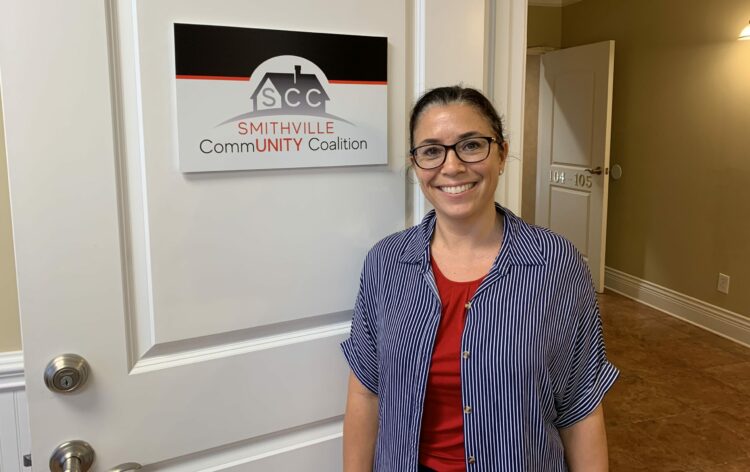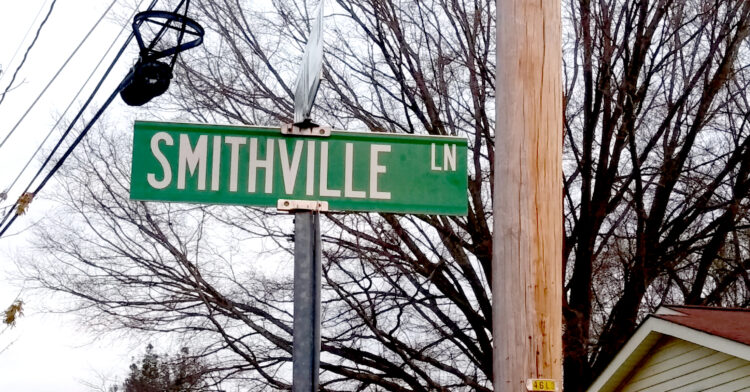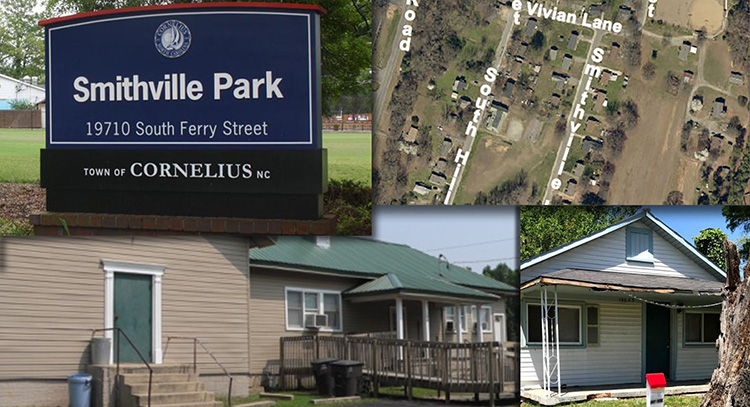
Dawne Kakitsis at the entrance to the Smithville CommUNITY Coalition office on Catawba Avenue.
Feb. 24. Editor’s note: The Smithville Community Coalition is gearing up both as a nonprofit and as an advocate for the historically African American community on the east side of Cornelius, primarily on the south side of Catawba Avenue. This article was written by a coalition staff member to help the public understand their work.
By Dawne Kakitsis
Smithville CommUNITY Coalition, director of fundraising and marketing
My workday at Smithville Community Coalition was winding down last Thursday. The office door opened and longtime Smithville resident, Ron Potts, showed up with his laptop. He wanted to talk about a presentation he was invited to give at the LKN Chamber of Commerce.
As we began reviewing his presentation the door opened again, a local woman bringing a donation to cover the membership fee for the Smithville Community Coalition to join the Chamber of Commerce.
I introduced Ron to Becky, a former principal, whose upbringing was very different from Ron’s. I witnessed the two of them find delight in chatting about history, education, the Rosenwald School, and their hopes for the Smithville community. This is what the road to connection and recognition looks like through shared stories of community members in our new office.
Smithville and the Town of Cornelius are commemorating the annexation of Smithville during the Black History Program event in collaboration with the Cain Center for the Arts on Saturday, Feb. 25. This is a time to reflect on the people and the place that is Smithville.
Smithville was. 
Smithville Community Inc. was originally formed as a nonprofit on Nov. 1, 1968, by long-time leaders in the Smithville community before its annexation to Cornelius to advocate for the community’s needs. The coalition was re-formed as the Smithville CommUnity Coalition on Oct. 13, 2012. The coalition was strengthened when the NCDOT decided to create an alternative plan for Exit 28 traffic that did not cut through Smithville. The fight for preservation and recognition within the Town of Cornelius continued.
In the early 1950s, the community had no water or sewer lines. The men in the Smithville community dug the trenches to have the pipes for the water lines placed in Smithville. This allowed water to be accessible to the neighborhood rather than just depending on well water.
The town provided the pipes, but the men of the neighborhood provided the unpaid labor. Before being annexed, Smithville functioned as an unincorporated part of Mecklenburg County.
According to the Town of Cornelius, Smithville residents attempted to be annexed in 1967. Smithville was denied annexation due to lack of a tax base. Sewage seeped from outdoor toilets and septic tanks in the yards of Smithville residents. The Charlotte News called it “Germ Town USA” in a headline for an article about the health and safety of Smithville residents.
Mecklenburg County passed a bond issue to fund a sewer line servicing Smithville in 1968. Most streets were unpaved. Residents had to transport their trash to a landfill or burn it in their yards. They did not have streetlights. After the damming of the Catawba River, which created Lake Norman, development came to Cornelius that encouraged them to annex Smithville.
This meant that Smithville residents would get town services, police and fire protection, garbage pick-up, and a voice in Cornelius government.

The many faces of Smithville
Smithville is.
Throughout its history and into the present, Smithville suffered the impact of segregation and federal housing policies limiting the appreciation of housing and real estate values. Despite being excluded from the Cornelius town boundaries and traditional town benefits available to white residents, Smithville residents built a thriving community that provided workforce housing to many African Americans in the Lake Norman area.
Under the leadership of Willie Jones, the Smithville Revitalization Plan was developed, presented, and approved by the Town of Cornelius.
The Smithville Community Coalition now has four full time staff, a new office, a new website, new social media platforms, and new branding to reflect the progress of the nonprofit.
The Town of Cornelius approved the need to support the Smithville Revitalization Plan and committed the first three million dollars in funding in public infrastructure for this project. The Town of Cornelius wants progress, but progress that enhances and spreads the history of Smithville rather than erasing it.
Smithville Community Coalition (SCC) is excited to announce that it has secured more than $3 million dollars from Mecklenburg County for land acquisition and overhead costs and $500,000 from the State of North Carolina. The SCC has earned grant money totaling over $200,000 from Wells Fargo, United Way of Greater Charlotte, and Bank of America in philanthropic contributions. The SCC has earned $5,000 in individual contributions.
The SCC continues to cultivate partnerships with organizations committed to our message, including Ada Jenkins Center, Habitat for Humanity, Peninsula Community Foundation, YMCA, Unity in Community, and the Neighborhood CARE Center.
Smithville will be.
It is imperative to revitalize Smithville because of the historic legacy tied to this place and its people. This community, arguably one of our town’s most important gems, is also on the cusp of one of the most exciting re-development plans of the era. Through establishing preservation easements along with restoration and rehabilitation on select historic properties and utilizing new construction for additional affordable housing, this plan offers the opportunity to preserve and revitalize an exceptional and important African American community.
As these redevelopment plans are implemented, Smithville will define itself and make history—again. It will define itself as a successful example of restoring and preserving old homes while celebrating that heritage. Smithville will lead the charge on securing affordable and work-force housing for generations to come. Community members will be able to age safely in their homes. Smithville will be a neighborhood free of lead pipes. 
Parts will be transformed; parts will remain in place. The term revitalization comes to the forefront.
The goal is to preserve the history of this African American community, to protect the elimination of vestiges of people and places, and to avoid gentrification and displacement. We want progress that includes the people who were systematically denied justice for a century.
This is about a community in pursuit of a town that is book-ended by a historic, African American community and new arts center.
This is about two people showing up in my office, talking about how their hopes for Smithville will continue to build that bridge toward full inclusivity. The Smithville Community Coalition’s office is a welcome place for those conversations about connection to one another and to our commUNITY.
You will recognize our office by the new, bright red sign proudly displayed outside our building at 21031 Catawba Ave., a tribute to the resilience and progress of this community and nonprofit organization founded in 1968.
The community is welcome to attend the monthly Smithville Community Meetings held on Mondays at Union Bethel AME Zion church. The next meeting is 6:30 pm. Monday, Feb. 27.
An office open house , at 21031 Catawba Ave. Suite 104, is planned for the end of April.




